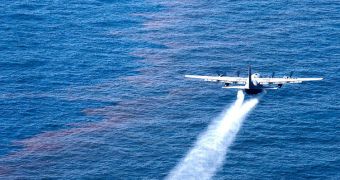According to the conclusions of a new scientific study, it would appear that numerous marine creatures, perhaps numbering in the thousands, are still at risk of suffering heavily from the disaster that affects the Gulf of Mexico.
Even if the oil leak caused by the collapse of the Deepwater Horizon drilling platform has been stopped in the end, vast amounts of oil still linger on beneath the surface.
The effects of these underwater plumes on deepwater organisms in the Gulf were the main focus of a University of Georgie study in the area, which was led by oceanographer Samantha Joyce.
Just days after news of the BP disaster broke, she applied for a Grant for Rapid Response Research, a special type of research grants offered by the US National Science Foundation (NSF).
This type of investigation is uncommon for oceanographers, which tend to have precise plans of how to conduct investigations in the open ocean.
“As an oceanographer, you are trained to make these detailed cruise plans. Everything is just so, 'I'm going to be here on day one and here on day ten',” Joyce argues.
The BP accident took place on April 20, the rig sunk on April 22, and on May 24 the researcher and her team were already in the Gulf, alongside colleagues from a number of other universities. They stayed there until June 6.
The team was based on the Walton Smith, a research vessel of the University of Miami. Joyce made some measurements near the site of the accident that left here bedazzled.
“The gas concentrations are outrageously high. We have measured concentrations up to 100,000 times what we typically see in the Gulf of Mexico,” she says.
The expert says that some of the organisms living deep underwater can indeed process some amounts of naturally-occurring hydrocarbon, but adds that the plumes which were produced were off the charts.
“There is a whole slew of organisms that depend on these natural seeps, and in these ecosystems, the one thing that these organisms need that can be taken away by this oil spill is oxygen,” Joye adds.
“That's because they eat oil and gas but the bacteria that sustain them are oxygen-requiring bacteria. So without oxygen, they can't survive,” she goes on to say.
But these deepwater organisms are currently being suffocated by the presence of excess methane in the water.
“It would be like having your Thanksgiving dinner, but suddenly the living room is filled with argon or CO2 instead of oxygen. There's all this food around you, but you can't eat it because you are suffocating,” Joyce concludes.

 14 DAY TRIAL //
14 DAY TRIAL //